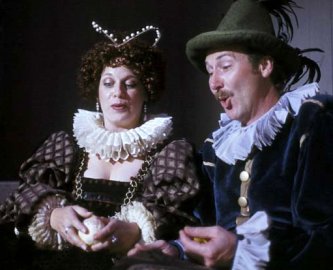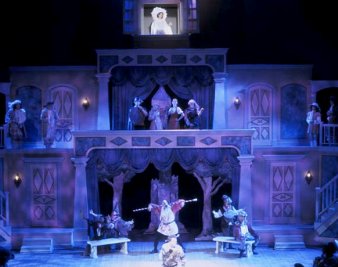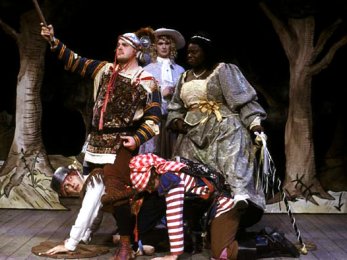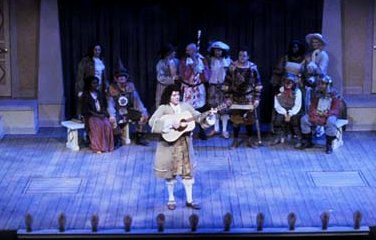Summary 
Beaumont and Fletcher's screwball comedy The Knight of the Burning Pestle fits well into the Illinois Shakespeare Festival's season, with its clash between the commoner and the privileged echoing the themes of the other productions - the contrast between city and country in As You Like It and the failure of rulers to recognize the anguish of the ruled in King Lear.
Design
Directed by Bill Jenkins. Set by Bradley Hellwig. Costumes by Kathleen Jaremski. Lights by Andrew Catron. Sound by Aaron Paolucci.
Cast
Frank Nall (George), Rebecca MacLean (Nell), Patrick O'Gara (Speaker/Host), Jack McLaughlin-Gray (Venturewell), Christopher Cantelmi (Jasper), Ailene King (Luce), Greg McGrath (Humphrey), Lisa Gaye Dixon (Mistress Merrythought), Tim Lueke (Michael), Tom Quinn (Merrythought), Ryan Woodle (Rafe), Rian Jairell (Tim), Michael DiPadova (George), Christine Cummings (Tapstress), D.C. Wright (Barber).
Analysis

Bill Jenkins directs the 1607 play like an extended Monty Python skit, with a grocer and his wife interrupting the playing of class comedy The London Merchant and insisting on the insertion of the adventurous tale of The Knight of the Burning Pestle starring their own grocer-apprentice Rafe as an errant knight. Jenkins sets the sprawling production upon a candle-lit yellow and green stage with a curtained balcony and French windows high above in a gallery. Three traps are visible, a slew of lights line downstage, and a pair of chairs are set halfway up stairs on either side of the balcony. Acoustic guitar picking can be heard as the audience takes their seats, and Jenkins uses the guitar and singing talents of Tom Quinn, who plays Merrythought while delivering most of his lines as makeshift songs.
Jenkins costumes the French-styled The London Merchant like the Three Musketeers, with the feather-capped men in boots, wigs, and doublet and hose, quick to brandish rapiers, and the women in colorful gowns. Before the directing Speaker can begin, Frank Nall's John Cleese-like George interrupts with shouts from the rear of the audience. Nall's George storms into a row of patrons, giving a "thumbs down" and exhorting audience members to join him. He urges the playing of a show like The Merry Wives of Windsor - "that tall, lanky fellow was brilliant!" - cheekily referring to Nall's own performance as Master Ford at the Festival in 1999. Rebecca MacLean's cockney Nell follows hard behind - "husband! husband!"- and when she squeals for their apprentice ("Rafe!") the onstage performers grimace and cover their ears against the high-pitched yell. Nell apes Rafe's "audition" movements from downstage, and when the Speaker allows the inclusion of The Knight of the Burning Pestle with Rafe as the lead, a motley crew of commoners swarm to take over the set.

Nall's George and MacLean's Nell dominate the production as well as the play-within-a-play. Seated in the elevated chairs upstage left, they nip from a flask and eat snacks, taunting Jasper, the romantic hero of The London Merchant, throwing nutshells and wrappers, and later fruit and rinds at him - "fie on the infidel!" - booing and hissing at him, and spewing beer in a shower upon him from the balcony. George and Nell target most of the characters from their rival play, Nell even venturing onstage to ridicule Venturewell's accent. Shooed offstage by the frustrated Speaker, she waves at George from her new seat on the opposite side of the balcony. After the effete Humphrey - prancing in flamboyant pink and sneering while wearing a curly black wig, pale makeup, and red lipstick - woos the heroine Luce, Nell chides the green-capped George for not being as romantic, and George stalks center stage, growling and glaring to chase the Speaker back offstage.

Ryan Woodle's reluctant Knight appears while his Squire and Dwarf - fellow apprentices Tim and George - enact his humble beginnings in dumb show from the balcony. Rafe wears a colander for a helmet, and a pair of throw rugs are strapped to his chest and back as makeshift armor. The giant he battles in the dumb show wears a soup pot over his head and a wooden "giant" sign around his neck. At each mention of the "burning pestle," the commoners, now exuberant but unskilled stagehands, erupt from doorways and windows to wave their arms comically at the pestle in the balcony.
The London Merchant receives constant interruption from George and Nell. When Venturewell bemoans that he is "rich in misery," the couple pretend to sob ("boo hoo") and play imaginary violins, and the Speaker fails miserably to direct the onstage mayhem as it devolves into a comical series of pratfalls and missed cues. He shouts down Nell's ploy suggestions, bellows "out!" to chase away commoner stagehands, then loses his wig on a low-hanging prop. Later, the Speaker muscles a scenery hand offstage, growling "proceed," to the perplexed actor portraying Jasper, and he stage-whispers "improvise!" while crouched behind a fence in the balcony, advising a stage loaded with confused performers. Before intermission, the Speaker lurches drunkenly, slurping from a flask, and sprawls when a stagehand blows a trumpet in his ear. He begins the second act lamenting "my play! My play!" and is carried offstage by the ragtag commoners, who hoist him over their heads and force him to play the part of the Host in The Knight of the Burning Pestle.

Despite their victimization at the hands of the grocer George and Nell, the characters from The London Merchant are colorful and entertaining. Michael, dressed in powder blue, prancing in curly golden hair and pale make-up, is a contrast to the romantic hero Jasper, who endures George and Nell's taunts with cringes, eye rolls, and shakes of the head. Humphrey, a ghastly delight with fish-faced expressions, reads over Venturewell's shoulder but frightens the elderly gentleman when he glances up and sees the Frenchman's made-up face. Tom Quinn's terminally merry and musical Merrythought, strumming his acoustic guitar, graces nearly every scene with a song.
The production's liveliest sequence involves Rafe's battle with the murderous giant Barberoso. The Host delivers an eerily amplified monologue as the theatre darkens, spinning the tale of an evil barber who hangs strings of his victims' teeth as trophies. The story is so compelling that the entire cast emerges from traps, doorways, and windows to creep closer and better hear the tale of the giant barber. Rafe leads the Squire and the Dwarf, and they enter to nighttime sound effects such a cricket chirps, owl hoots, the cries of coyotes...and the "baa" of a sheep. Back-lit in stage smoke, Barberoso appears amid dramatic music, wearing a bloody apron and wielding a barbershop pole. A comical slow-motion battle ensues, and the Barber, Rafe, Squire and Dwarf deliver head blows and crotch shots, with the flying bodies and squirms of pain all expertly timed to the music and finishing in Rafe's victory to spontaneous audience applause.
The London Merchant concludes with Jasper and Luce finally joined - "there's no more to be said" - but George indignantly interrupts ("I don't like it!"), and he and Nell demand a dramatic conclusion for Rafe and The Knight of the Burning Pestle. Rafe appears mortally wounded with "a forked arrow" shot through his head, and after he expires, Quinn's Merrythought plays his guitar and croons a ballad that concludes both plays-within-a-play - and this production - on a happy note. Jenkins' chaotic show, all frantic flurry and sometimes difficult to follow, rewards the effort with its silly spirit, and the audience rises to its feet, saving its loudest cheers for Woodle's heroic apprentice Rafe.
Note: A version of this article was edited and published in Shakespeare Bulletin, Vol.21, No.3, Fall 2003.